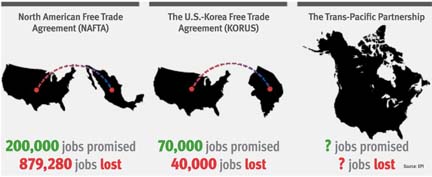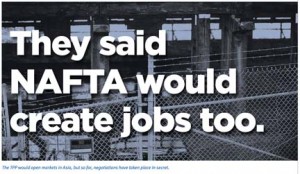On the way back from his middle-east trip, President Obama recently made the statement in a speech that the fears surrounding TPP are exaggerated, and that once it is passed and people can see what is in it, they will like what it has. If that is true, why isn’t the text available now, and why is Obama wanting to fast track the agreement through Congress? Why is it so secretive if it is so wonderful? Is there fear of an euphoric reaction?
The agreement, known in shorthand as the TPP, would be history’s largest single multinational free trade agreement that could significantly transform the U.S. economy. The 19th round of talks among a dozen negotiating countries took place in Brunei last August in which participants said significant progress had been made in negotiating tariffs. In November South Korea announced interest in joining the negotiations, become the 14th country to do so. Talks have since stalled over concerns in Japan over opening its highly protected market. With mid-term elections in the U.S. in November, talks are likely to be on hold at least until the end of the year,” reports International Business Times.
Two years ago, President Obama signed the US-Korea Free Trade Agreement. Since then, what have we gained?
- U.S. goods exports to Korea have fallen below the pre-FTA average monthly level for 21 out of 22 months since the deal took effect.
- U.S. average monthly exports to Korea have fallen in 11 of the 15 sectors that export the most to Korea, relative to the year before the FTA.
- While losing sectors have faced relatively steep export declines (e.g. a 12 percent drop in computer and electronics exports, an 11 percent drop in exports of machinery), none of the four “winning” sectors have experienced an average monthly export increase of greater than 2 percent.
- Average monthly exports of U.S. agricultural products to Korea have fallen 41 percent.
- The average monthly U.S. automotive trade deficit with Korea has grown 19 percent.
- The United States has lost an estimated cumulative $9.2 billion in exports to Korea under the FTA’s first two years, compared with the exports that would have been achieved at the pre-FTA level. (Source: Huffington Post Business)
Huffington Post Business, Lori Walloch, Director, Public Citizen’s Global Trade Watch, writes “…even if you count only exports on the Korea FTA’s unhappy second birthday, it’s bad news. And American farmers, ranchers and auto and other manufacturing workers — the sectors Obama said would be the major winners — are the hardest hit.”
“Oh, and imports did increase too. Our bilateral monthly trade deficit with Korea has ballooned 47 percent. Using the administration’s export-to-job ratio, the estimated $8.6 billion drop in net U.S. exports to Korea in the FTA’s first two years represents the loss of more than 50,000 jobs lost. Recall that Obama said the pact would generate 70,000 new American jobs overall.”
“All of this would be sufficiently alarming on its own merits. But, the Korea FTA text was literally used as the U.S. opening text for most of the Trans-Pacific Partnership (TPP). Despite these shocking results, Obama hopes to close the controversial 14-nation TPP during his April Asia trip instead of taking the actual outcomes of the Korea FTA seriously and launching a major rethink of the TPP.”
“But the Korea FTA pact’s dismal outcomes are making it even more difficult for the Obama administration to get Congress to delegate away its constitutional trade authority via Fast Track for the TPP. While two-thirds of House Democrats opposed the Korea pact in 2011, many of those who supported it are now announcing opposition to Fast Track, having been moved by the evidence of its damage and the emptiness of the administration’s promises. And GOP members who supported the FTA are also facing heat as the damage sinks in.”
After signing NAFTA 20 years ago, Americans have leaned that trade agreements mean corporate profits at the expense of American jobs and economic stability. They know it means our markets will be flooded with products made overseas for sale at cheaper prices than can be produced in the US without child labor and sweat shop conditions. And these concerns do not even begin to address some of the things TPP purports to include.
Indeed – the International Brotherhood of Electrical Workers (IBEW) states in their publication, “The Electrical Worker,” “Critics of the deal question what good can come from a trade agreement where negotiations have so far been held in secret. Legislators, unions, environmental and other citizens groups have been excluded from the talks, while more than 600 corporate lobbyists have been inside the discussions from the beginning.” Halliburon, Chevron, PHRMA, Comcast, the Motion Picture Association, and a host of other corporations have all been seated at the negotiating table. But not a single citizen representative has been invited.
Americans are tired of suffering from buyers remorse because of poor decisions made by our government. If a law, regulation or agreement will profoundly alter how we live, how we work and what rights we have, we should have a say about it. That is called democracy. An agreement written behind closed doors in secret for the benefit of corporate sponsors and forced on a population is called a plutocracy, and that is NOT American.
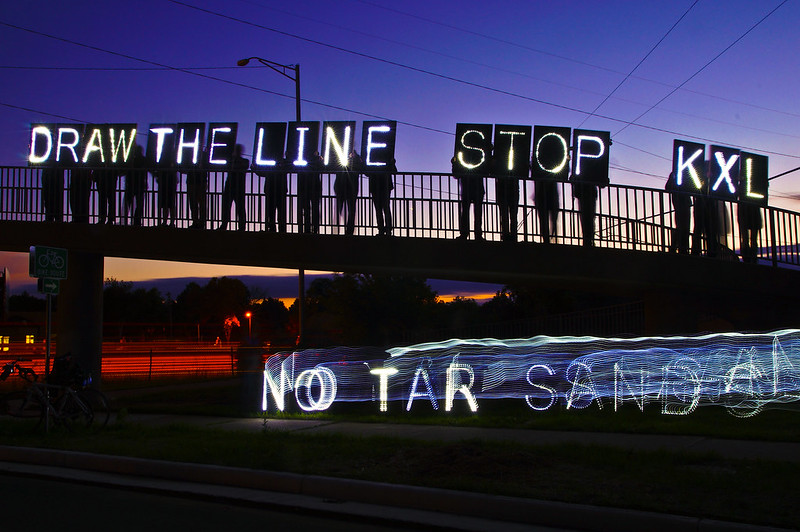



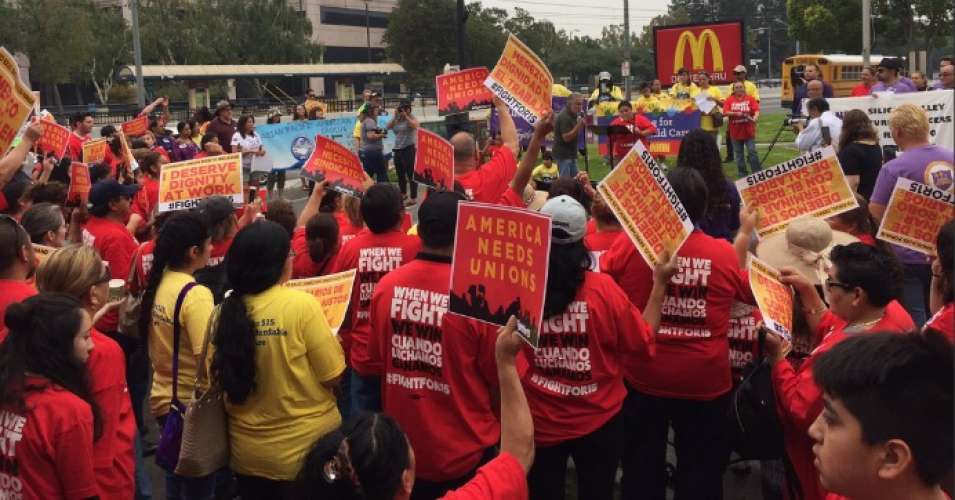
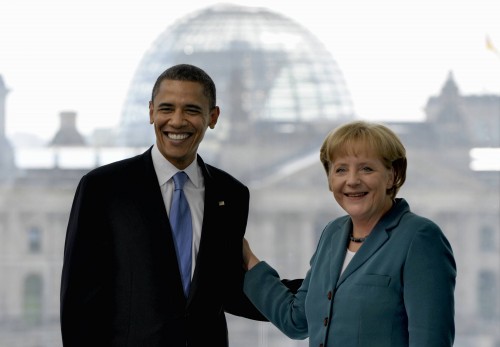



![Trade Ministers from TPP meeting in Vladivostok. Photo by East Asia and Pacific Media Hub U.S. Department of State [Public domain], via Wikimedia Commons](http://occupyworldwrites.org/wp-content/uploads/2014/11/Trade_Ministers_from_Trans-Pacific_TPP_Meeting_in_Vladivostok_7940097642-300x199.jpg)
